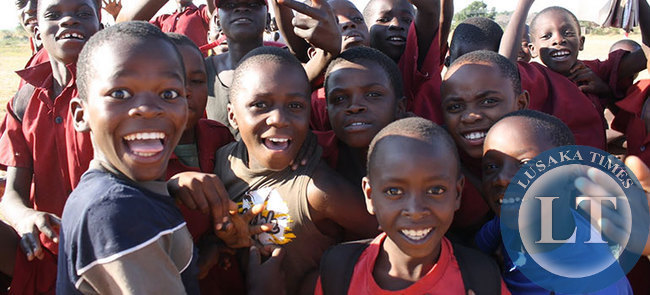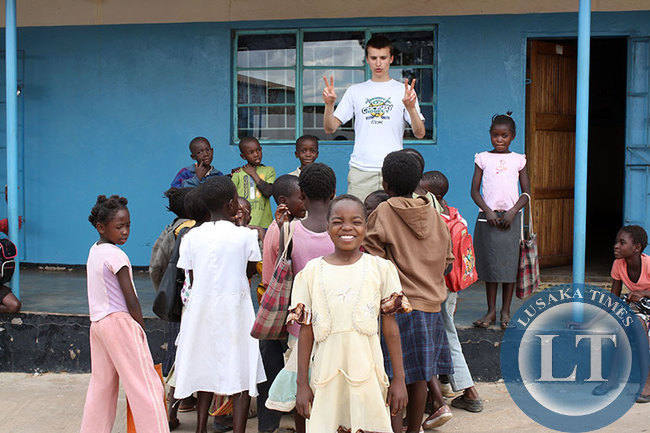
Spirituality and connection to nature are good predictors of Zambian children’s well-being, according to a University of British Columbia study published in the current issue of the Journal of Happiness Studies.
UBC researchers Mark Holder and Tim Krupa, Okanagan College instructor Ben Coleman, and University of Alberta instructor Eugene Krupa completed a two-year study using three measures to gauge happiness among Zambian children and adolescents between ages 7 to 19.
The results confirmed earlier work suggesting that spirituality is a stronger predictor of children’s life satisfaction than religion.
“Our analysis shows that children’s and adolescents’ sense of spirituality and connectivity to nature explain variation in their life satisfaction beyond other factors such as religiousness,” says Tim Krupa.
“That suggests that having an inner belief system and feeling close to nature may be more important to promoting well-being than practising religious rituals.”
Zambia reports high levels of participation in organized religion.In the study, 95 per cent of respondents attended church in the past month and 96 per cent reported that religion was important to them.
Despite developing-world living conditions, children and adolescents in Zambia also reported levels of happiness that are comparable to those observed among Canadian children.The study found children and adolescents rated themselves highly in terms of happiness and life satisfaction.
Using a “faces scale,” a measure of happiness that includes drawings of faces, the distribution of happiness ratings by children was similar to results for children in Western Canada and India in previous studies by Holder and Coleman.
Tim Krupa, who completed his research as an undergraduate student, travelled to Zambia in 2011 and 2012 on an International Education Travel Subsidy from the Irving K. Barber School of Arts and Sciences.
He holds a Bachelor of Science degree in biology from UBC Okanagan’s Irving K. Barber School of Arts and Sciences and expects to graduate this spring with a master’s degree in political science from UBC’s Vancouver campus.
Holder is an associate professor of psychology at UBC Okanagan.
The study included 1,329 participants from one rural school and five urban schools in three Zambian provinces.



And I am a happy parent
Again there are gaps in this study…Zambian children is kind of pushing it too far…do you find street kids in Canada, desperate as those we have in Zed? The population used in this study does not represent Zambian children, but a section of them…Nevertheless, a follow up study should be conducted in the next five years or so when these kids are teenagers…the picture will not be as rose, there is nothing to celebrate here…my opinion!
A very good observation Prince! Indeed we cannot the study to represent the happiness of Zambian children when the study only addressed on one rural school and five urban schools in three Zambian provinces.Surely the results of this research are far fetched and people should not even get excited that their children are happy. It is good for his thesis but seriously, the results do not represent the situation in Zambia except the 6 schools he dealt with. He should have taken care of the limitations in his study.
@Prince. I have lived in Canada and I can confirm that there are street kids here in Canada and they are just as desperate as the ones at home. The only difference is that the canadian govt has a very good program to deal with that. They have foster parent program and shelters that protect kids. Wish our govt would do something like that. But you also need to understand that a kid is kid. As long as he has shelter, food and something to play with, he/she will be happy. That is why they also have a free pass to Haven.
i dont think they measured the happiness of children in shanty compounds and rural areas results would be the opposite otherwise
Equally in the compounds, the children are happy because that is the type of environment they know and they have happily adapted to such an environment! Happiness is a relative concept concept!
How do Zambian children, and even adults behave when they are in the presence of strangers especially foreigners and white people? What happens when we receive a visitor in our homes? Give the best out of us, including countenance.
Maybe the research methodology should considered these factors.
While it may be true that “children are children” they have a tendency to smile in the presence of strangers, more so with white people. Could be a strategy to please in anticipation of receiving something from the visitor.
People are generally happy in any setting as they learn to live with whatever condition they are in (we adapt as a human being). Dissatisfaction usually kicks in when you start comparing or if you have lived a certain way before and then you lose that type of living for something more difficult or below the standard you were used to. So this study does not really prove anything.
Good point. happiness is relative.
As Zambians we are the most happy people even when we live under PF oppression, filth and poverty. Canadian children are happy because they have everything and live in clean towns and cities. we have two totally different kinds of happiness. Happiness under plenty and happiness under poverty
But we are all happy
I work hard to make myself happy and i have a happy family! Woe to all those who expect politicians to make them happy!
As for this research, i think it leaves much to be desired because certain fundamental variables have not been empirically tested and verified! For example, how will the results be if the Canadian children are brought in the Zambian environment for the entire period of the research? Equally, how will the results be if Zambian children are exposed to Canadian environment?
Therefore, i feel that the levels of happiness should be measured based on the exposure of the specimens to both environments!
Happiness can only come to if you don’t crave for things beyond. your reach. Live within your income and you will find true happiness
Fiddler On The Roof quote (paraphrased): ‘They are so poor they have no idea how happy they are.’
This says it all…
Do not expect the PF government or any other government to make your kids happy. Work hard and provide for your children whether it is Tute, Kandolo, GoTV or DSTV. Do your best and your kids will be happy. Take them to the best possible Schools in your area. One thing I have seen what people are not seeing in this study is discouraging religion. Take your kids to church with you and they will be happy. Differentiate between wealth, riches, poverty and happiness as these are not the same.
A lot of the happiest people I knew in Zambia were poor and uneducated. I realised later in life that education and money aren’t necessarily keys to happiness. Most of those people I saw on the streets were very happy compared to the educated and the rich. Even here the uneducated seem happy all the time, you don’t see them going for holidays during the summer, they don’t drive the best cars around and I doubt they have millions in their bank accounts but you see them happy and laughing because they have people who love them, and they have people they love. I have never heard of any person that was dying that said they wish they had accumulated more degrees or more money, they all say they wished they had spent more time with family members. People are more important than stuff.
Well, two of my friends took their children who were born in the UK , to Zambia for the first time. Believe it or not, the kids didn’t want to come back to the UK at the end of their holiday. According to them, ‘eating mangoes straight from a tree was an “awesome experience”; playing in the backyard for hours – instead of being locked indoors was “unbelievable!” These kids were so surprised to find kids playing on their own in ‘parks’ without being ‘supervised’ and now one of my friends daughters says she wants to go back to Zambia to live with one of her aunties. Speaks volumes!! There’s more to life than ‘shopping’ xboxes, game consoles etc. These kids have said it all! It takes a whole village to raise a child.
Zambia is a peaceful nation just like Canada. Peaceful environments make for happy people. Now let them hunt our lions and destroy the very nature that makes these kids and Canadian kids happy by watching nature watch on television. They will be kambwili mp upset all the time.
Viva Edith Nawakwi.
Obviously the children were just happy interacting with muzungu and nothing else. He does not even explain the reasons for happiness. Obviously kids in Canada are happy because they have most of the things they need. So this research is flawed and lacks credibility.
Are we talking about R.B’s, Kambwili’s, or Kaiser Zulu’s children here??
Please get real!! A child without a healthy square meal, health or education prospects in Kaoma, Katete, or Kalomo, can & will never be compared to a Canadian kid, as the Zambian Childs developmental needs will always be stifled by the kind of cursed thieving politicians Zambia seems to constantly roll off its conveyor belt.
WHAT A JOKE!!!
Kikikikiki, hic! This study would be funny if it was not so sad:-(.
Where do you even begin to compare?
Comments are closed.